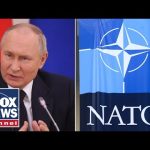President Donald Trump is pushing hard to end the Russia-Ukraine war through tough negotiations instead of sending American troops. Former deputy national security adviser K.T. McFarland says Trump’s business skills are key to getting both sides to make deals they don’t love but can live with. She claims Trump is using rare earth minerals in Ukraine as bargaining chips to get talks moving.
The Biden administration wanted Ukraine to wait until Russia gave back all captured land before talking peace. McFarland says that plan was unrealistic and kept the war stuck in a bloody stalemate. Trump flipped the script by telling Ukraine it won’t get NATO membership or lost territories back – forcing them to negotiate seriously. At the same time, he warned Russia that America will keep arming Ukraine until a deal is done.
European nations closest to Ukraine have mostly relied on U.S. money and weapons during this war. McFarland says Trump is making them step up by asking why America should defend Europe’s backyard alone. She argues this pressure is working, with NATO countries finally spending more on defense like they promised years ago.
Some global leaders worry Trump’s deal might let Russia claim victory without real consequences. But McFarland insists any agreement stopping the fighting is better than endless war. She says Trump’s focus on rebuilding Ukraine’s economy after the war could help them “win the peace” even if they lose some land now.
Liberals claim Trump is abandoning Ukraine by not giving blank-check support. Conservatives counter that three years of Biden’s policies only got more deaths and no progress. They say Trump’s tough love approach forces Europe to handle regional threats instead of always begging America for help.
McFarland praises Trump for treating foreign policy like a business deal – finding what each side wants most and making tradeoffs. For Ukraine, it’s security guarantees and rebuilding cash. For Russia, it’s keeping some land and avoiding total defeat. For America, it’s access to Ukraine’s valuable minerals and less taxpayer spending.
Critics warn Putin can’t be trusted to keep any deal, pointing to broken promises in 2014. But Trump supporters say strong leaders enforce agreements through power, not paperwork. They argue letting Europe lead this peace process prepares them to counter Russia long-term without constant U.S. babysitting.
The big question remains whether Trump can actually get both sides to stop fighting after so much bloodshed. McFarland says his blunt style works because everyone knows he’ll walk away if deals aren’t fair. She claims that’s why Putin and Zelenskyy are finally talking – they fear losing more under Trump than gaining through war.




